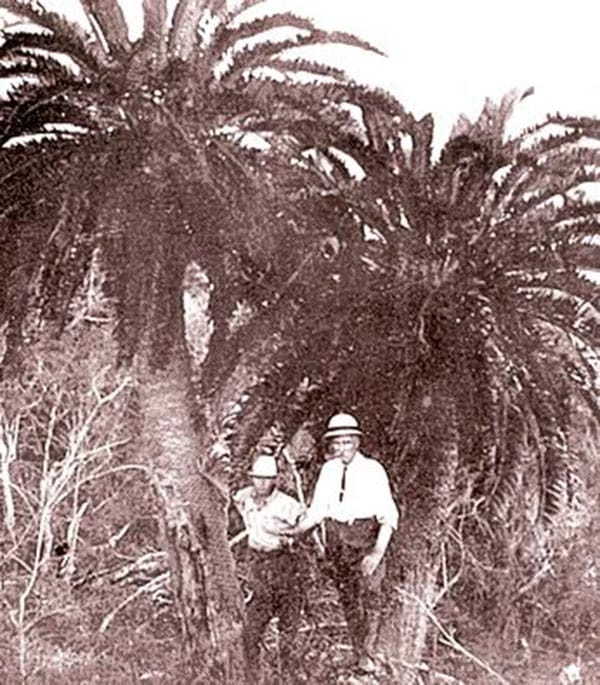
A plant older than the dinosaurs might hold the title for the “loneliest plant on the planet.” This title isn’t an exaggeration – with no known female specimens left in the wild, the species faces extinction.
Discovered in 1895 in the Ngoya (oNgoye) Forest in KwaZulu-Natal, South Africa, Encephalartos woodii (E. woodii) or Wood’s cycad, is an incredibly rare cycad (a group of plants pre-dating dinosaurs by 100 million years), which has only been propagated through male clones in captivity. Natural re-population seems impossible – until now.

The original (male) stems of Wood’s cycad at Ngoye (then known as Ongoye) Forest. A basal offset of the main stems was removed and sent to Kew Gardens in 1899. Wood’s deputy, James Wylie, subsequently collected three basal offsets in 1903, which were planted in the Durban Botanic Gardens and at the National Botanic Gardens of Ireland. The smaller one on the right was presumably collected by Wylie during a 1907 expedition and moved to Pretoria, where the stem subsequently died in 1964.
Using AI (artificial intelligence), University of Southampton researcher Laura Cinti is on a quest to find E. woodii a mate. Using a drone, she captured tens of thousands of aerial images of the Ngoye Forest, the plant’s last known habitat. Cinti then trained an AI model, an LLM (Large Language Model), to analyze the vast amount of data and identify plant life. This powerful tool can even detect species that human eyes might miss.
While the search hasn’t yielded a female E. woodii yet, the drone has only covered a small portion (around 2%) of the potential habitat. This glimmer of hope is significant – E. woodii’s lineage, cycads, are living fossils, existing on Earth for a staggering 300 million years. These palm-tree lookalikes with evergreen leaves and cones have weathered several mass extinctions, but human activity now threatens their very existence. The university considers cycads “the most endangered organisms on our planet.”
Cinti’s innovative approach with AI might just rewrite this story of unrequited love. “I’m hopeful there is a female out there somewhere,” she shared in a press release. “After all, there must have been at one time.”
With the help of cutting-edge technology, E. woodii might finally have a chance to find its long-lost companion and avoid a lonely fate.

